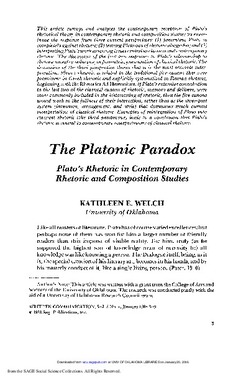| dc.contributor.author | KATHLEEN E. WELCH | |
| dc.date.accessioned | 2016-01-14T19:53:13Z | |
| dc.date.accessioned | 2016-03-30T15:32:09Z | |
| dc.date.available | 2016-01-14T19:53:13Z | |
| dc.date.available | 2016-03-30T15:32:09Z | |
| dc.date.issued | 1988-01-01 | |
| dc.identifier.citation | WELCH, K. E. (1988). The Platonic Paradox: Plato's Rhetoric in Contemporary Rhetoric and Composition Studies. Written Communication, 5(1), 3-21. doi: 10.1177/0741088388005001001 | en_US |
| dc.identifier.uri | https://hdl.handle.net/11244/25134 | |
| dc.description.abstract | This article surveys and analyzes the contemporary reception of Plato's rhetorical theory in contemporary rhetoric and composition studies by examining the response from three current perspectives: (1) presenting Plato as completely against rhetoric; (2) leaving Plato out of rhetoric altogether; and (3) interpreting Plato's work as raising issues central to classical and contemporary rhetoric. The discussion of the first two responses to Plato's relationship to rhetoric reveals a reductive, or formulaic, presentation of classical rhetoric. The discussion of the third perspective shows that it is the most accurate interpretation. Plato's rhetoric is related to the traditional five canons that were prominent in Greek rhetoric and explicitly systematized in Roman rhetoric, beginning with the Rhetorica Ad Herennium. If Plato's extensive contribution to the last two of the classical canons of rhetoric, memory and delivery, were more commonly included in the historicizing of rhetoric, then the five canons would work in the fullness of their interaction, rather than as the three-part system (invention, arrangement, and style) that dominates much current interpretation of classical rhetoric. Examples of reintegration of Plato into classical rhetoric (the third perspective) leads to a conclusion that Plato's rhetoric is central to contemporary interpretations of classical rhetoric. | en_US |
| dc.language.iso | en_US | en_US |
| dc.publisher | Written Communication | |
| dc.title | The Platonic Paradox: Plato's Rhetoric in Contemporary Rhetoric and Composition Studies | en_US |
| dc.type | Research Article | en_US |
| dc.description.peerreview | Yes | en_US |
| dc.description.peerreviewnotes | https://us.sagepub.com/en-us/nam/manuscript-submission-guidelines | en_US |
| dc.identifier.doi | 10.1177/0741088388005001001 | en_US |
| dc.rights.requestable | false | en_US |
